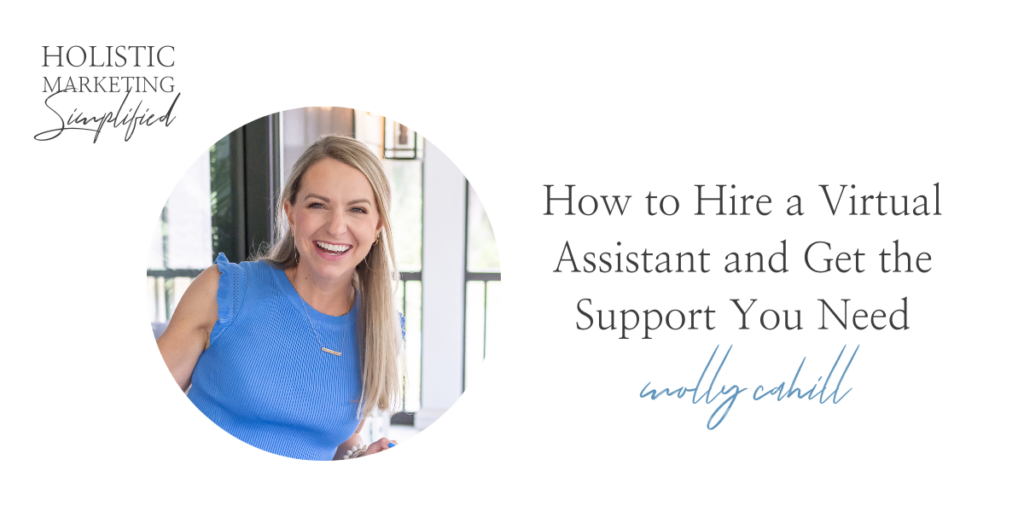How to Hire a Virtual Assistant and Get the Support You Need [Episode 112]

Subscribe on Your Favorite Podcast Player
Apple Podcast App | Spotify | Stitcher
How to Start Outsourcing in Your Business
If you feel like your to-do list is never-ending and you’re constantly rolling tasks over from one week to the next—you’re not alone. So many of you, whether you’re running a brick-and-mortar practice, an online business, or a mix of both, are stuck in this cycle of trying to do it all yourself. And if I’m being honest? It’s holding you back.
In this replay episode of the Holistic Marketing Simplified Podcast, I’m talking about something I wish more business owners would embrace sooner—outsourcing. Specifically, how hiring a virtual assistant (or an in-person assistant!) can free up your time, reduce your stress, and allow you to focus on the things that actually light you up.
What is a Virtual Assistant?
A virtual assistant (VA) is simply someone who can help you with all the things that pile up on your plate. And spoiler alert: they don’t even have to be virtual! You can hire someone locally to help in your practice, remotely, or even a hybrid of both.
Some common VA tasks include:
- Inbox management
- Graphic creation
- Tech setup (like email lists, landing pages, or website updates)
- Social media support
- Calendar scheduling and admin tasks
The possibilities are endless—and the relief is real.
How Do You Know What to Outsource?
If you’re wondering, but what would I even delegate?, I’ve got you. Here’s my go-to rule:
👉 Look at the tasks that keep getting pushed to the next day (and the next, and the next…).
👉 Look at the tasks that are important but never feel urgent.
👉 Look at the things that drain your energy, even if you’re technically “good” at them.
Those are exactly the things you should consider handing off.
Where Do You Find a VA?
You can find virtual assistants through:
- Referrals from other business owners
- Local Facebook groups
- Virtual Assistant directories like Sarah Wiles’ matchmaking site
- Even people already in your community or office (yes, your CA or front desk person can learn these skills!)
I share even more tips in the episode, including what you should expect to pay, how to know if someone is a good fit, and why it’s okay to start small.
Stop Trying to Do It All
You do not have to be a one-person show. If you’re feeling overwhelmed and wondering why you can’t get it all done—it’s because you’re not meant to!
This episode will help you finally take that first step toward getting help so you can focus on what you do best.
Connect with Molly
Instagram | Facebook | Youtube
The Holistic Marketing Simplified Podcast is brought to you by Holistic Marketing Hub, our hybrid program that supports you with personalized coaching, caption templates, and virtual classrooms. In this program, we teach health and wellness professionals how to fish, but also bait their hook!
Make sure you’ve hit that follow or subscribe button on on your favorite podcast player to get notified each week as we air new episodes!
Episode Transcript
Hello and welcome back to the Holistic Marketing Simplified Podcast. I always feel like I'm a game show host 'cause uh, my microphone stand is broken. And if you've been listening to the podcast for a while, you know that my microphone stand has been broken since like episode three. And here we are on like episode 112 and I still have not bought a new one.
So I just kinda hold it like Bob, like Bob Barker. But today's episode is actually a replay of one that I did last, gosh, it might have been like last May. I. Not quite a year ago, and I wanted to replay this one specifically because it still is coming up over and over and over and over again of all of you, amazing, talented human beings trying to do everything yourself and wondering why you just can't do it all.
It's like, it's like the definition of insanity people. You gotta get some help. So this episode is all about. I'm using the word virtual assistant, but it doesn't have to be virtual. You'll hear in the episode it talk about how you can have somebody in person, uh, what tasks they can do for you, how to find them, how to know what tasks to give them, how you pay them, um, all, all kinds of things.
So if you are one of those people who just continually keeps having this to-do list where things aren't getting crossed off and they just keep getting moved to the next day, and then the next week, and then the next month, this episode's definitely for you. So I hope you enjoy this replay.
Hey, welcome to Holistic Marketing Simplified. This podcast boils down to the fact that we wholeheartedly believe that more humans need to know about holistic health solutions. And you didn't go to school to learn how to be a full-time content creator and show up on Instagram and do all of this marketing stuff all day, every day.
So let's come hanging out while we chat. All things ease in your marketing and my goal is that you shift your mindset around your marketing from a quote should to a I get to more dream patients and clients. Yes, please. Hi, I'm Caitlyn Ross, a virtual counselor based in Rock Hill, South Carolina, and I love listening to the Holistic Marketing simplified podcast.
Talk about all things virtual assistant or just like. It doesn't have to be a virtual assistant, but just like getting help in your business because I find this strange thing happens and I guess my brain just doesn't comprehend. 'cause I'm like the world's like biggest outsourcer, even in the online business space.
But I would say I see it more in the brick and mortar business space. People just kind of expect to have to and need to do everything themselves. And there's also a misconception that, that, oh, I can't, you know, I can't outsource this, or I can't get help until I've blank. Like, and I'm not a business coach, right?
Like I, I've talked about it on the podcast before that. Um, I, I approach growing my business a little differently than probably most business coaches would advise you to do. But I'll never forget I had, um. Someone DM me and, uh, this was about, I don't know, a year ago, and she goes, wow, I've never met anyone who manages to do more than I do.
And I was like, wow, that's so inaccurate. Like, am I portraying this person on Instagram who's like doing it all? Because let me tell you, I am not. I have someone who helps me clean my house. I'm actually transitioning to have someone to come once a week who's gonna help with laundry and cleaning instead of like, just like normal deep cleaning.
I, my daughter is in school full-time and then when she's not this summer, um, the neighbor is gonna come watch her four days a week, uh, four hours a day. Um, so I've always had childcare even before I could afford it. I literally. Sacrificed paying myself a lot in the beginning to put in some foundational pieces, only because I know my personality, so I'm So that might not not be the right, that might not be the right path for you.
Right, that's what I'm saying. Like I'm not a business coach, you know, whether or not, okay, I've gotta pay myself to put food on the table or whatever, that this is not what I'm talking about. I'm talking about the fact that, like I said, especially in the brick and mortar space, I think a lot of people hear the term va and they're like, well, first of all, they ask what it is, and I'm, I'm gonna define that, so don't worry.
And they're like, well, I'm brick and mortar, like I don't need a virtual assistant. But this doesn't have to be somebody who's virtual. It can, it can still be someone who's virtual if you're brick and mortar, or it can be somebody you know who physically comes into your office. So just consider, and I, and I'm gonna talk about my litmus tasks for knowing like what tasks, um, this person can do for you.
But just think about for a moment what would happen if you could let go of just a little bit and get some help in your business. Okay. So first of all, what is a virtual assistant? What is a va? So you'll hear me saying va again, as I said, VA doesn't necessarily have to be virtual. Um, it could some be somebody who like works.
In your office part-time, or if you're an online business, it could be someone who is completely virtual, or even if you're online, it could be someone who comes to your house part of the time, even if you're, you know, comes to meet you at a coffee shop at work. So don't let the, like the word virtual throw you off.
'cause it can be or it can't be, or it can be hybrid or whatever. VA is like the most generic umbrella term for so many things. So when someone asks me, what does a VA do? I mean, it's like asking, I don't know. I don't have a good analogy. This is like a very generic umbrella term. You think about, like a lot of people have like personal assistants, right?
Like we think about like CEOs and stuff, having personal assistants. But why, why does it have to be a CEO? Why do you have to be a C-suite executive to have some type of assistant? Um, I'm also going to talk about the term OBM, which stands for online business manager. Some people do lump that person under the VA umbrella.
They aren't necessarily VAs, but I'm gonna talk about that and just thinking about. If they're not a va, think about any contractors. Who can, and I'm gonna talk about employees versus contractors as well, but think about any contractors who just can help you in your business. So for example, I have a podcast editor who's a contractor.
I have a copywriter who helps turn these podcast episodes into SEO Rich blog posts. I have, uh, a bookkeeper, I have an accountant, so a lot of people are quick to think about, oh yeah, I outsource my taxes, but it's like, well, why can't we, you know, outsource some other things. Right? And then also I do, I am gonna touch on how, uh, a social media manager and I, I guess technically you could lump social media manager under the VOA umbrella, but.
That's kind of like every social media managers like cringe. 'cause we're like, it's just so, so much more than that. So anyway, we're gonna talk about that as well, just to kind of paint the picture for you some task, and this is so not even remotely and all inclusive list of things a VA can do for you.
Okay? This is just like scratching the surface. Can they help you make graphics? Uh, whether it be like, you know, like for example, my VA just recently helped me make a tri-fold brochure for the, uh, Stephanie Waner scale up event. Or, you know, sometimes I want like a carousel on my Instagram. This is a way you can kind of dabble in having someone help you in your social media without having an actual quote social media manager.
Are they someone who can help you with, you know, checking your inbox and maybe doing like the first pass at filtering your emails? I know when my grandfather passed away, I was able to ask Maria my amazing VA to go in and reschedule all my appointments. So that's another thing they can do. Tech is a huge one.
Huge, huge, huge. Can they help you set up landing pages for your email or maybe even just set up your email list altogether, help keep your email contacts updated. Can they help you know, do updates on your website or, I mean, you name it, set up MiniChat triggers. Like I said, the, the possibilities are seriously endless.
Sometimes you might hire a virtual assistant to be more just like on, for a project, like a project basis, or you might hire somebody to be more ongoing. And I'm gonna talk about, I. A little more in a little bit, little while, but I always recommend at least starting someone for a project just to kind of see if you're the right fit.
So you're gonna be like, Hey, my project for you is to, uh, you know, I've been wanting to start email marketing. I want you to take all of my contacts from my. EHR system. I want you to sign this HIPAA release form. I want you to export it as a CSV file, import it, you know, and you might not even know these steps, right?
Like if you get somebody who's skilled, they're gonna know what to do and you're not gonna have to tell them what steps to do. Create a, a accountant flow desk and set up, you know, a landing page and help me create this lead magnet of all these things that I've like, brain dumps onto a, a document and make it pretty, and then set it up.
Like I said, like you can always like come, come up with some type of project basis. And then the other, the next thing I wanted to talk about is. Certain virtual assistants can be specialists and some are going to be more general. What I mean by that is when I transferred, I had like four different softwares all having to like talk to each other, and I transitioned everything into Kartra, which is my favorite, all in one tool.
So Kartra is what hosts my course, my email list, my affiliate programs. You name it. It's kind of like my CRM. It's all in one. Most of you in my audience don't need anything that robust. 'cause you have to remember like my main. Bread and butter is my online business, right? So that's why I needed something a little more robust like Kartra.
And so when I first switched to Kartra, I hired someone on a project basis to do the migration, which means, you know, they had to pull in. Um, I used to be on Thinkific, was where my course was, where was my email? ActiveCampaign. And then I had one other. What was I, oh, lead pages is what I was lead using for my landing pages.
So basically this person on a project basis took all of my assets from those three different platforms and then migrated them to Kartra. So to find that person, I literally just like Googled. I actually, she was a referral, but if I. Had, you know, not known where to find her, I would've googled like Kartra specialist.
So some people are, like I said, like, like true specialist. Um, some people might be kind of like, I don't know, I'm gonna call 'em like a subspecialist, where it's like they're really great at tech, but they don't wanna be any type of client facing, like, they don't wanna be in your email. They don't wanna be responding to clients, but like.
They're super techie. They are good at like troubleshooting and figuring things out. And then you'll have some people that are probably like more on the creative side and they're better at the like visuals and the graphics and they're more, they're okay. You know, being client facing. I. So as you can kind of see, like I said, there's just, there's like a whole big variety of these types of, of lovely humans on this planet that can help you.
Now in terms of pay, obviously the more specialized and the more experience they have, the more it's going to be. I would say, um, I have paid anywhere from 20 all the way up to $75 an hour, depending on what this person was doing for me. When I say 75 an hour, that was someone who, she really was an hourly.
It was just kind of like a contract, and she, I can't, she just literally, I don't know how to describe it. She just somehow was this magical unicorn who was good at tech. She was good at pretending to be me and writing copy, like she was just like magic. So don't, don't think like you're gonna right off the outta the gate like be paying somebody that much.
I am gonna touch on kind of like a slightly, I don't know what the word is, it's not taboo, that's not the right word, but like a lot of people will talk about outsourcing and hiring a virtual assistant in the Philippines and they're like, $5 an hour is a great rate for them. My. Maine virtual assistant is actually in the Philippines, and I definitely do not pay her $5 an hour.
She makes way more than that. And I asked her about this. I was like, Hey, what's the deal with this? Um, is it a misconception that Americans have that $5 an hour is a great wage? I was like, I hate, I hope this isn't like a super sensitive topic, but I'd love to, you know, like help. Fix this in at least my circles.
If, if that's the case. And her response was actually that, unfortunately in some provinces in the Philippines, people are so poor and they live in such really, really, really, she's like, her exact words was like, you wouldn't believe the conditions that to them $5 an hour actually is. Better than what they were getting.
And a lot of the agencies that employ, like, so there's a lot of like, um, I don't know the names of them, but like, there's like agencies where you can go and find someone. Well then my brain's like, okay, well if I'm going through an agency and I'm paying $5 an hour, well then the, the VA isn't getting $5 an hour 'cause the agency's gonna be taking cut, but.
The upside is also like they are training them. They're giving them a skill, they're providing them with a computer and internet, which she says a lot of people in some of these provinces don't have. So she said it really just depends on where they live in the Philippines. So anyway, I'll do with that information, what you will.
It's never sat well with me, but you know, then again, maybe, like I said, maybe it's a big opportunity that this person's gotten that they wouldn't have gotten otherwise. And anyway. Anyway, that's all I'm gonna say about that topic. So I would just say though, like a general rule would be to start out somebody who doesn't have a ton of experience, 20 to $25 an hour, and then someone who's more experienced, who you literally, they're like, they're just like, they don't require any handholding, they don't require any training.
You're gonna be paying a little more. The other thing I wanted to note about virtual assistants, which is so great, is sometimes I like to hire based on their personality traits versus their current skillset. So sometimes you'll just have someone who's like, oh no, I'll figure it out. Like I'm just somebody who can figure it out.
And like I have one girl on my team in particular, I can think of who we wanted to add Google Business profile services for our Instagram management clients. And I'm like, well, I don't know how to like, I mean, I know how to like physically, I could like go figure out how to do it, but like, I don't know best practices.
It's kind of like with Instagram, like yeah, like. You might have someone who's like, I know how to post, or I know how to make camera graphics, and they can go put that on your Instagram. But that doesn't mean it doesn't make them a social media manager, and it doesn't mean that it's actually all optimized.
So I bought a Google Business profile course and she went through the course and learned how to do it. So I would say. Probably about the last 10 students of mine for Holistic Marketing Hub have actually been like a, a ca or a VA or a a. Office manager or someone in an office who, and not just chiropractic, who is actually taking the course on behalf of their employer.
So it's like, that's really cool. 'cause then you're upskilling somebody who's already physically in your office, which I, I highly recommend 'cause our, for one thing, our agency's full right now. But even if it wasn't, we love working with our clients, but. We have certain clients who give us lots of video and assets and certain ones who don't, and I wish I could be close by to the ones and just like actually go film it myself.
So. What a cool thing when there's somebody right there in your office, right? So like I said, that's another way of training is to put them through a course. If you're like, Hey, I wanna learn how to set up these mini chat triggers, and then like you get someone who just has the personality type, who maybe doesn't already have that skillset, but is willing to learn.
Okay. My favorite part of this episode is going to be how do you know what tasks to give your va? And there's two different ways you can approach it. My litmus test has always been what do I find myself putting on my to-do list that doesn't get crossed off? If you've ever heard of, uh, the Eisenhower Matrix, is that what it's called?
It's like the quadrant where there's four quadrants and it's urgent and important. Urgent and not important. Not urgent but important and then not urgent, not important. I find the majority of the tasks that I end up delegating are the ones that fall in that third quadrant, which is not urgent, but important.
What that means is those are the things that are really going to move the needle in your business and move your business forward. But other things that are higher priority time-wise just keep coming up. And I don't wanna say like you're always like putting out fires all day. 'cause it doesn't necessarily have to be anything negative.
It's just like, you know, there's certain things that have to be done. On a timely basis and then you run outta time. So when I first started my business, I always tell this story. It's so funny 'cause I'll look back like, like Al I knew I wanted to start an email list and I'm pretty tech savvy. I can usually like figure things out to a certain extent except for don't make me figure out Facebook ads.
I bought a course for that and then like literally cried three times. Um, but my email list, I knew I wanted to do it, but I kept putting it off. 'cause at the time I was just literally me. It was just a one woman show. I kept putting it off, putting it off, putting it off, and finally I was like, I'm just gonna pay somebody to set up my email list for me.
'cause I had this idea for a lead magnet and I had it kind of all like typed out. I don't remember, I think it was around like 75 bucks. I paid this lovely gal to create my lead magnet and set up my email list for me. And it took her like several hours and then it was just done. Like, oh my gosh, why did I not, why did I not do this sooner?
So, like I said, the the things that you just keep putting off and you're like, oh, I'll get to it when I get caught up. Like that quote, I'll get to it when I get caught up. And you're like, yeah, yeah, right. When's that day actually going to come? Those are great things to outsource. And other people like to look at it from the whole like zone of genius perspective, which is also not a bad idea.
It's like, okay, well my zone of genius is okay. I can only be the one who's actually seeing clients or seeing patients. Well, that's obvious. You can't outsource that. I also enjoy X, Y, Z in my business. Those um, or that's like the things that I'm really good at. That's my zone of genius. I think that's really great.
In theory. It doesn't always work out that way. For me, and I guess maybe it's something I'm doing wrong, I don't know. I'll give you a prime example of my Zone of Genius is talking to you. I love being in my dms. I love talking to potential clients and students like sales are my jam, networking is my jam.
It's literally my favorite thing to do. It's definitely my zone of genius, right. But just because I am the CEO, one of the things that I really wanted to do in my business was to follow up with anybody who commented the MiniChat trigger word on any of my Instagram posts. I wanted to make sure to go follow up with them in dms, like, you know, three to five days later to make sure that they had actually been able to download the free resource and look at it.
Because I'm somebody who needs follow up personally, and so I'm like, I wanna provide that for my people, right? Because you have, you know, when you've commented a word before, I'm like, my favorite Amazon paint supplies. And then you like, comment the word and then it gets like lost in your dms and you never see it again.
Maybe that's just me, but I wanted to make sure I had built in an extra touchpoint for all of those people who wanted my free resources, and I just like kept not doing it. So now one of my awesome assistants goes in and helps follow up with those people, even though that's something that's in my zone of genius.
It was still one of those important but not urgent tasks that wasn't getting done. Next, let's talk about how we, and, and then don't worry, we're gonna wrap it up with where to find people, how to pay them, are they contractors, employees, whatever. But next, let's talk about how to kind of help manage the tasks for whoever is going to help you.
I use Loom a lot, LOOM. It's just a free Google Chrome plugin. I, I mean, I have the paid version because we literally make so many loom videos in my business. That I have to have the paid version, but it's just a free screen recording tool that you can just like literally record yourself making videos if you need to make training videos.
Our team also uses Asana, A-S-A-N-A as our project management tool. But there are a million of them. There's Trello, there's Clickup, there's Monday. You know, don't, don't like go leave whatever tool you're currently using because I say we use Asana. It's just like they're all great. We also communicate via Slack.
Which can integrate with Loom, it can integrate with Asana, all this kind of stuff. But you, again, it's not something you have to use. You can still just do text or Voxer, walkie-talkie or whatever, just depending on how big. Like we didn't move to Slack until probably two-ish years ago. We mostly communicated on Voxer, which is like a walkie-talkie app.
But now that the business has gotten so big and gotten so complex, and I have such a large team, it's just easier to keep things more organized in Slack. So that's how we do that. And then I also wanna note you remember at the beginning I talked about an OBM or an online business manager. So what that means is this person is really more like the integrator.
Like maybe you've heard visionary and integrator, so many people are trying to do both roles, right? Like you're the person, like thinking of the idea, like you are the intellectual property or whatever. So that you know, you might be the provider or whatever. And you have all of these. Ideas, and I'll give you a prime example.
I have a lot of clients who, you know, they're still seeing patients full time, but they have created an online course and it's just sitting there, not selling. A VA would be a great person to come in, but really an OBM online business manager would be. Probably an even better person. And full disclosure, they're usually more expensive than a va, but this is the person who's gonna look at your business from like the COO's, like Chief Operating Officer, like I said, integrator operations, whatever you wanna call it.
From that lens. And Carolyn, my OBM has been with me for four years in June and she's literally like my right leg, like the Charleston Content creation retreat I just had, she basically planned the entire thing. She's the one that contacted the restaurant and, you know, set up the catering and help, you know, did the gift bags and kept the budget spreadsheet and.
Even like the landing pages to talk about what was in the retreat. ODMs typically aren't the people actually setting up, like setting up the pages, but they're the ones that are communicating with your va. So usually you have an OBM and a va, and then the OBM serves as like the person who's actually like tasking and following up with the va.
She's even helped me do like interviews and hire, like when we were migrating to Kartra, I'd like, Hey, can you help me find someone who can help with Kartra? They can kind of, like I said, be more of like the manager of the people. So you know how, think about it like an online version of if you have an office manager and the office manager helps hire and train your cas, that's the like.
What an OBM is for your online business. So, like I said, they're not thinking in tasks where like in that same example, Hey, I've created this online course and it's not selling, but I don't have time to think about it 'cause I'm seeing patients full time. A VA would be great, but you're still gonna have to be the one steering the ship and telling them what to do and tasking them versus an OBM is gonna be the one who's like gonna think in the more like.
Broader scheme and then can go and, and some ODMs are kind of hybrids, especially if they're just starting out and they'll be like, no, I can, I do tasks as well. Like, yes, I'm an OBM, but I'll also like go in and create the landing page if I need to. So you just gotta interview and look around. Okay. If all of this overwhelms you and you're like, oh my gosh, I don't want all these people, you don't have to just, like I said, start with somebody simple.
Start with something simple, with the thing that annoys you the most and keeps getting not crossed off your to-do list. And then you can always grow from there. Don't feel like you have to, like, like I've had my business for five years. I definitely did not have a team this large in the beginning. It was a slow, slow, slow buildup.
Okay. And then the last thing is how to, uh, or where to find them and how to pay them. So in terms of where to find them, a lot of people I have found have just been through like referrals from friends. So I've looked at other businesses that are similar to mine and said, Hey, do you have a really good virtual assistant you like, or whatever?
There's also like my friend Sarah Wiles, trained VAs, and she has a free virtual assistant matchmaking website and that's S-A-R-A-W-I-L-E-S. You could just Google her name and she's got a, a VA matchmaking website. There's also free Facebook groups, um, one's called the virtual Assistant Savvy's. One's called like how she did that.
You can look in local Facebook groups. You could even like look at like. Existing clients or patients in your office, and again, look for more. Hey, you never know. You might find someone who's already trained or you might see someone who just really has that go get 'em attitude. Who's willing to learn, and if you want them to help you with your social media, put them through the hub.
And then remember how I said a lot of times I have them start out on a project basis versus ongoing, just to make sure that it's all going to work out. And don't get discouraged if you choose the project basis. Don't get discouraged if more communication and time is needed in the beginning, because as you know, you two get used to working with each other.
It's obviously gonna get easier and easier just like it is training anybody new in your business. And then last but not least, how to pay them. I am not an employment attorney, so I'm not telling you what to do and don't say Molly said to do this because every state is different. Some are stricter than others.
Typically, from what I've heard, it's like as long as you aren't their sole source of income and you know, you're not providing all their equipment, you're not dictating their hours, whatever, they don't have to be an employee. But like, I mean, all of mine contractors, just because they fit the criteria to be 10 99 contractors, so my bookkeeper sends them, you know, the proper tax forms at the end of the year.
I don't withhold taxes. Like I said, they're all contractors and of course if they're overseas, they can't be an actual employee anyway. Right. And, um, so like I said, you'll have to figure that out. What, you know, talk to your own, uh, employment attorney, CPA, what's gonna work best for you. If they're already established, they're already gonna know all this.
They're gonna know how to to invoice you. Um, I've had people invoice me with PayPal, with Wave HoneyBook, dub sodo. Like I said, most everyone already has their own invoicing software, but if they're brand new and they're just learning, then you can even do like a direct bank draft, which is how I pay most all my people now.
I use Relay Bank 'cause it's set up for Profit First, so Direct Bank draft, or like I said, wave is another really popular invoicing software, you know, or just do PayPal, whatever. I pay all of mine monthly, so they bill me on the first of the month for their hours the previous month. I have, some people are hourly and then some people on my team, like my OBM, Carolyn, she's on just like a retainer contract, so I pay her the same amount.
Monthly, no matter what. She doesn't track her hours, you know, whatever. It's just like, she's like, like I said, more of a retainer. And so I, I would recommend at the beginning, like either getting a quote for like a project basis or doing hourly. Hourly, just until you can kind of build up that trust with somebody.
So, like I said, it's, it's all kind of different. Some people wanna be paid every two weeks. There's just a whole variety. But I hope that was helpful and I wanna end by telling you about one of my favorite new resources. I created a very, and this, this is more like you said on the social media side. I created a very in depth free resource on that you can use for someone that's going through the hub on your behalf.
It has a checklist for each and every individual classroom they've watched inside the hub, and it has a. Full checklist of weekly and monthly deliverables. And the deliverables we pulled, I didn't just make 'em up, they're exactly what we would do for our Instagram management clients. Um, there's also like a sample job description and pay rate, and you can literally just grab that and that's like, if you're looking for help with your social media specifically, then that's kind of your blueprint.
Like it tells you exactly like I said, the hours, the deliverables, the sample pay rate, everything. It's really cool. So you can just grab that@mollycahill.com slash sm and we will link that in the show notes. All right, there you have it. Uh, if you have any questions, please reach out to me on Instagram, uh, via dms.
I love chatting with you and I hope you enjoyed this episode. Thank you for listening to Holistic Marketing Simplified, and hey, you know how every podcaster at the very end of their episode asks you to rate and review their podcast. Well that's because it's super important. These podcasts take a lot of time and heart and effort to produce, to bring you free information.
So in order for me to be able to continue doing that, we need more people to find out about the show. So if you could please just take like two minutes out of your very busy day. To leave me a rating and share this on your Instagram stories and tag at Molly a Cahill, that's C-A-H-I-L-L. I would greatly, greatly appreciate your support.
I know your time is valuable and I can't wait to see you in the next episode.




![How to Create Unique Content That Stands Out in a Saturated Market [Episode 107]](https://mollycahill.com/wp-content/uploads/2025/02/How-to-Create-Standout-Social-Media-Content-for-Your-Practice.png)

